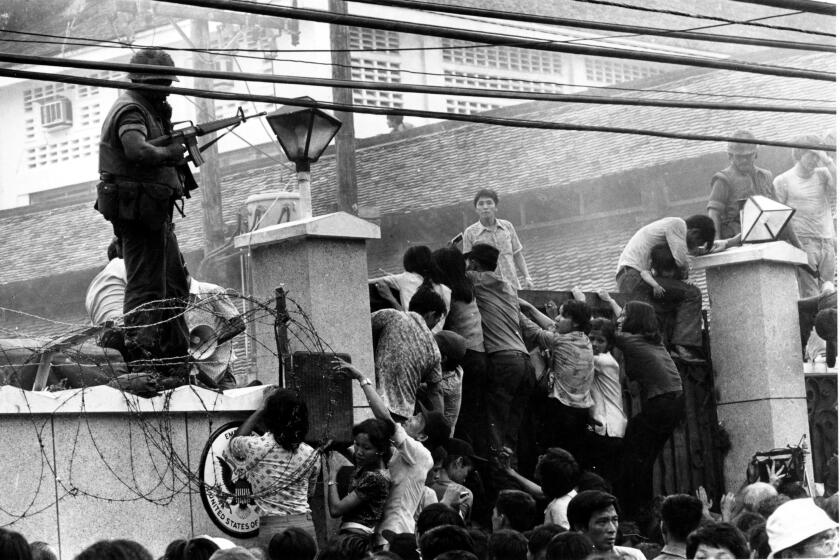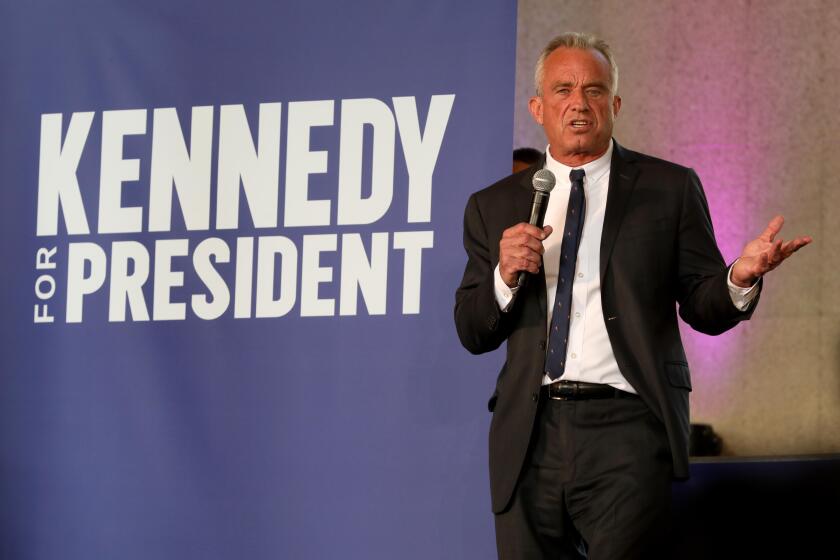Bush Says It’s Too Early to Respond With Cash : Reaction: Soviet aid is still seen better as incentive than reward. But the pressure from Europe is increasing.
The White House on Saturday signaled its approval of what now amounts to a democratic revolution in the Soviet Union but continued to insist that it is too early to respond to the changes with any new economic aid.
“There’s just a lot of things that have to happen before we can move forward,” President Bush cautioned when asked whether the United States is now prepared to offer cash to Moscow to help rebuild the crippled Soviet economy.
That emphatic restatement of the U.S. insistence that the Soviet Union adopt clear economic reforms before it can expect broad direct Western assistance reflects an Administration view that such aid is better suited as incentive than reward.
Saturday’s dramatic move by President Mikhail S. Gorbachev to cast aside the Communist Party, an institution that had been a continual drag on reform, is nevertheless certain to add new volume to the calls from European leaders who contend in the wake of the failed uprising against Gorbachev that now is the time to offer cash to Moscow to help consolidate the reforms.
With the leaders of France and Germany urging that the West extend such aid, and Britain expressing increasing sympathy for that view, the White House announced that the United States will send a representative to a meeting Thursday in London as officials of the seven leading industrialized democracies gather to discuss the matter.
But Bush insisted Saturday that he feels no pressure to reverse his position even in the face of the rapid changes that, in the space of two days, have wrought an extraordinary transformation in Moscow.
“Eventually there may be a way we can help with money,” the President said after completing a round of golf near his vacation home here. “But before that, we’ve got to see reforms in the Soviet Union.”
Indeed, Bush suggested that the very speed of the upheaval may have hardened his reluctance, because the shake-up at the highest levels of the Soviet leadership has left the United States uncertain as to “whom we’re dealing with in these ministries.”
As the historic changes continued to sweep across Moscow on Saturday, with Gorbachev’s decision to quit as chief of the Communist Party and to recommend that the party Central Committee dissolve itself, the vacation White House here maintained a demeanor that, while approving, has been deliberately low-key.
The White House chose in response to the news to issue only a brief written statement that welcomed the events as “another step forward in the reform process.” And Bush, questioned by reporters before Gorbachev made the move official, observed blandly only that he saw “nothing adverse” in what he had heard from Moscow.
The determined effort to tread carefully reflects a White House view that, with words as with aid, the transformation in the Soviet Union can best succeed without American interference.
The opposition of the United States to what would amount to a Western bailout of Moscow was central last month to the decision of the Group of Seven industrialized democracies to extend only technical support for reforms of the Soviet economy.
Administration officials say that only after the Soviet Union has moved more decisively toward a free-market economy would it be prudent to extend the broad cash assistance that might otherwise be squandered. The President said Saturday he believes that the failure of the coup against Gorbachev “removes some of the roadblocks” to such Soviet economic reforms.
But Bush may find his Administration’s tight-fisted position further tested, if only gently, beginning today as he hosts consecutive visits to his seaside home here by prime ministers Brian Mulroney of Canada and John Major of Britain.
The British leader, in particular, has suggested that it might be useful for the West to send a more tangible signal of approval for the changes that have taken place.
In a separate sign of the extent of fallout from the failed coup, a senior Bush Administration official predicted that the Baltic republics of Lithuania, Latvia and Estonia can achieve independence in the near future.
“I would be surprised if they aren’t free within the next six months,” Deputy Secretary of State Lawrence S. Eagleburger told Rowland Evans and Robert Novak on their CNN interview show.
In fact, Eagleburger said, “I wouldn’t be at all surprised to see Mr. Gorbachev himself embrace” independence for the Baltics.
While acknowledging that Russian President Boris N. Yeltsin is now the senior partner in his relationship with Gorbachev, Eagleburger cautioned against assuming that Gorbachev is now “odd man out or that he’s totally reduced in power and will not again rise to a position of strength.”
“I think it is far too early to make that judgment,” the deputy secretary said.
Eagleburger said that Gorbachev’s earlier refusal to distance himself from the Communist Party indicated that he had not yet “grasped the reality of the need to really reform--and reform quickly.”
“But I don’t think it’s particularly relevant one way or the other whether he says he’s a Communist,” the deputy secretary went on. “What I do think is relevant is . . . (that) clearly the Communist Party in the Soviet Union is bankrupt as an institution. It isn’t going to be there any longer. That’s clear.”
Eagleburger also foresees improved U.S.-Soviet relations as a result of the failed putsch. “While I wouldn’t want to ever praise a coup,” he said, “I think the fact of the matter is that, in the aftermath of that coup, the United States is better off in the relationship with the Soviet Union than it would have been before that.”
Times staff writer Stanley Meisler in Washington contributed to this story.
More to Read
Get the L.A. Times Politics newsletter
Deeply reported insights into legislation, politics and policy from Sacramento, Washington and beyond. In your inbox three times per week.
You may occasionally receive promotional content from the Los Angeles Times.






